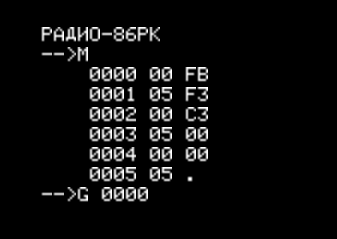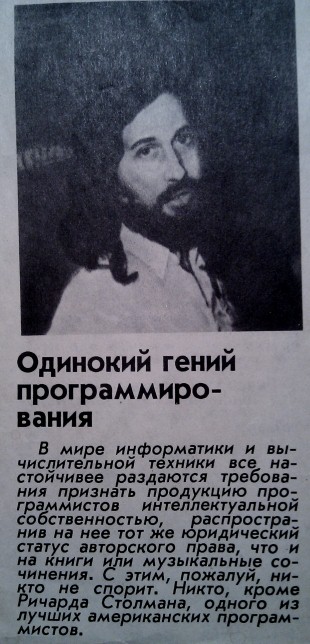/*
* @author: Maxim Fridental
* @version: 1.0
* @description: Yet another nostalgic post. Handcrafted in HTML.
*
* TODO: stop whining.
*/
Today I’m facing the last 0x0f days of my life as software developer.
# I have very strong and mixed feelings about that, because being
# software developer is part of my identity.
# In 1987, for the very first time I’ve typed and run a program.
# I’m not author of it. It was printed in a magazine, and I’ve just entered
# it. After turning on, the computer was typically finishing booting in under
# 0.5 seconds, and then the prompt appeared, and the user could enter commands.
# The M command allowed to change memory locations, and the G command started
# execution from the specified address. Here is an assembler listing:
.org 0
ei # Enable interrupts
di # Disable interrupts
jmp 0
# The “interrupts enabled” pin of the CPU wasn’t used for interrupts in my computer,
# but was attached to a speaker instead. The speaker had a low-pass filter before
# it, so that even though the CPU ran at around 1.8 MHz you could hear an audible
# tone. I still remember how happy I was hearing it! I’m not that much happy
# today even when I buy my next gadget.
# The very first programs I’ve written myself were based on that code. I was
# adding various amounts of NOPs, EIs and DIs, experimenting with different tones
# I could produce using the speaker, until somebody would come over to me and
# said in an artificially calm voice: could you please shut your thing up? And
# then, everybody was enjoying the silence.
# Maybe for a couple of minutes or so.
# Because I would then use my tape recorder to load a game and start playing.
# We had text-mode games that have compensated their lack of
# fidelity and performance with razor-sharp balance. If you are
# interested, here is a JavaScript emulator.
http://radio86.googlecode.com/hg/online/radio86.html
# You want to select the game called “KLAD” (note the dropdown list is not
# alphabetically sorted).
# In fact, I’m very lucky that my first games were text-mode based. The further
# game development went along the way of improving fidelity and adding multimedia,
# without any significant improvements in the balance (also known as the Flow), so
# that I wasn’t interested in them and avoided the fate of becoming a serial gamer
# spending all his free time on boss raids in some virtual world.
# I was captivated by the software development though. About this time, one of
# the USSR scientific magazines has published the following article named
# “A lone programming genius”:
# One of the strongest american software developers Richard Stallman,
# said the article, is against copyright on software. I was so fascinated
# I’ve cut out the article and pinned it on a wall above my table. I
# too wanted to become an ingenious programmer and to have an article
# about me published in a popular scientific magazine. I didn’t know that
# I had more chances to achieve the “being lone” part though.
# My conversion into software developer finished in 1993, when I’ve
# read the article “How to make an own game” in the russian edition
# of PC World magazine. Not only it has been written by Andrei
# Rodionov, a guru of software development (20+ years of experience
# at that time) and has provided a lot of concepts, patterns and
# practical gems on software development in general. But it also
# had such a lovely extreme spectrum of its topics, spanning from
# the details of the C syntax for pointer dereferencing to the
# philosophical summits of comparing programming with creating
# an own little universe, and going through the Ten Commandments
# applying them to the virtual objects living in the software runtime.
# And have I already said this article had amazing illustrations?
# Now, 25 years later, I can say that being software developer
# has profoundly influenced all my life in very many ways.
# I love my work. I have fun when working.
# I live more life, because I have 8 hours more fun per day.
# I earn above average.
# I have freedom of move, as this job is everywhere the same.
# I work in the society focus field (IT has replaced the
# astronautics of 60-ies), which is
# more rewarding
# less bureaucratic
# has more possibilities for self-realization
# has more possibilities to change the world
# I have also obtained a number of specific abilities:
# rapidly understanding things by making a mental map
# subdividing a large complex task into smaller palatable ones
# subconscious time and space optimization of everything
# powerful signal-to-noise filtering during communication
# rapid information retrieval
# Therefore I’m very grateful to God, to my parents and to my
# friends, teachers and colleagues who allowed me to live
# these very fulfilling 25 years in the way I’ve lived them.
/*************************************
* So long, source code! I love you! *
*************************************/


